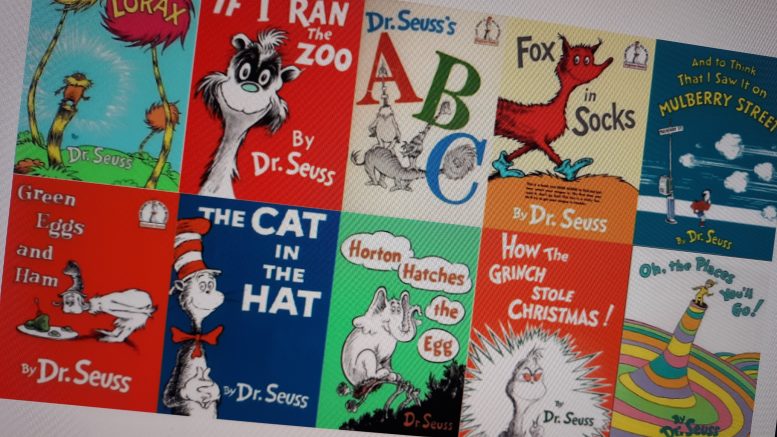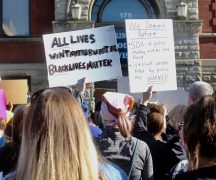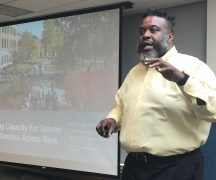By JAN LARSON McLAUGHLIN
BG Independent News
Bill Herald had one Dr. Seuss book when he was a child – “On Beyond Zebra.” Last Thursday, Herald lamented the fact that his beloved childhood memory and five other Seuss books were no longer to be published by Dr. Seuss Enterprises.
“It’s disconcerting to me that someone who has contributed so much to societal conversation” have books discontinued, he said. “Where does it stop and who’s next?”
As Seuss books became a topic of discussion across the nation last week, Herald’s comments prompted a conversation at a recent Not In Our Town Bowling Green meeting.
Rev. Gary Saunders addressed the misconception that the liberal left was “canceling” Seuss.
“That is being misrepresented. His foundation itself made the decision,” Saunders said. “No one canceled him.”
The books no longer to be published are “And to Think I Saw It on Mulberry Street,” “If I Ran the Zoo,” “McElligot’s Pool,” “On Beyond Zebra!” “Scrambled Eggs Super!” and “The Cat’s Quizzer.”
The announcement read as follows:
“Today, on Dr. Seuss’s Birthday, Dr. Seuss Enterprises celebrates reading and also our mission of supporting all children and families with messages of hope, inspiration, inclusion, and friendship.
“We are committed to action.
“To that end, Dr. Seuss Enterprises, working with a panel of experts, including educators, reviewed our catalog of titles and made the decision last year to cease publication and licensing” of the listed books.
“These books portray people in ways that are hurtful and wrong,” the statement read.
The six books included caricatures of people of African, Asisan and Arab descent. For decades the caricatures went relatively unnoticed. But times and levels of awareness have changed, Saunders said.
“They really jump out,” he said. “I’m sure if he was around, he would be the first to point them out,” Saunders said of Theodor Geisel.
The decision to no longer publish a handful of Geisel’s books does not lower the standing of Dr. Seuss “beloved treasures,” Saunders said. It’s just that “society is coming along.”
The books are not being banned. They are not being canceled.
The announcement by Dr. Seuss Enterprises, has created a surge of support for Seuss classics. Dozens of his books reportedly shot to the top of Amazon’s print best-seller list, and last week, nine of the site’s top 10 best sellers were Seuss books.
After publishing his first Seuss book in 1937, Geisel went on to publish more than 60 books that have sold an estimated 700 million copies globally.
Geisel, who died in 1991, reportedly made efforts later in his life to tone down racial stereotypes in some of his books.
Karla Davis-McGowan, another member of Not In Our Town, praised the action taken by Seuss Enterprises.
“I applaud them for cleaning up their own house,” she said. “That’s going to encourage me to buy more of their books.”
Another member, Ana Brown, talked about growing up with a “healthy dose of Dr. Seuss.”
“Kids notice. They may not have the words to describe what they are seeing,” Brown said.
The decision will allow Seuss Enterprises to highlight all of the author’s great works, Brown said. She also talked about the need for people to “look at the whole person” in all their grayness. Brown referenced Thomas Jefferson, and the need for people to not just view him as a brilliant statesman or a man who owned people – but in his entirety.
Saunders pointed out the conversation that the Seuss Enterprise action has stirred nationwide.
“The whole country is talking about kids’ literature – its divisiveness, its imagery,” he said. “The kind of imagery that is going in front of our children is super important.”
And now that is part of a national discussion.
“It’s pretty unusual to have everyone talking about children’s literature,” Saunders said.
Last week, the Wood County District Public Library announced it will keep three controversial Dr. Seuss books in circulation.
Library Director Michael Penrod said that as a government agency removal of the books would amount to censorship.
“That’s their right,” Penrod said of the Seuss Enterprise decision. “Our role at the library is a little different. As a unit of government it would be improper to remove them.”
The library is guided by the principle of allowing patrons to make their choices, he said.
The library collection includes three of the books no longer being published – “And to Think That I Saw It on Mulberry Street,” “If I Ran the Zoo,” and “McElligot’s Pool.” These books offer the chance to discuss how publishing and what was considered acceptable has changed over time, Penrod said.





